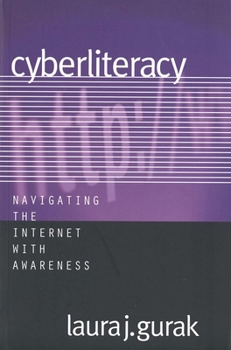Cyberliteracy: Navigating the Internet with Awareness
Select Format
Select Condition 
Book Overview
The Internet has changed our social spaces, our political and social realities, our use of language, and the way we communicate, all with breathtaking speed. Almost everyone who deals with the Internet and the new world of cyberspace communication at times feels bewildered, dismayed, or even infuriated. In this clear and helpful book, computer communications scholar Laura J. Gurak takes a close look at the critical issues of online communication and...
Format:Paperback
Language:English
ISBN:0300101570
ISBN13:9780300101577
Release Date:September 2003
Publisher:Yale University Press
Length:208 Pages
Weight:0.55 lbs.
Dimensions:0.6" x 5.1" x 8.2"
Customer Reviews
2 ratings
Cyberliteracy Book
Published by Thriftbooks.com User , 19 years ago
The book was delivered in a reasonable amount of time and in good condition. I would definately do business with them again!
Great Guide for "Navigating the Internet with Awareness"
Published by Thriftbooks.com User , 22 years ago
Cyberliteracy is, as its title might suggest, and as the author writes, "a rubric or a guide to literacy in cyberspace: a guide to cyberliteracy" (5). The book examines theories of literacy in light of the increase of computer mediated communication practices. Gurak argues that we need to develop a new cyberliteracy, one that will allow us not only to passively use computer technologies, but also to engage with them critically. Critical cyberliteracy involves understanding that artifacts have politics as well as understanding that users of technologies can also shape the future of technologies. Gurak writes: "Changes to our social spaces, our use of language, and our political and economic realities are ever more complex as the Internet becomes the mass communications medium of a new era" (4). Gurak's primary terms of analysis are speed, reach, anonymity, and interactivity, "the functional units by which most Internet communication takes place" (29). Each of these factors has changed dramatically as everyday life involves more and more computer mediated interactions. Understanding the implications of these four terms in relation to computer technologies forms the foundation of Gurak's proposed cyberliteracy.Cyberliteracy is not simply the functional "computer literacy" that we are commonly sold these days. Critical cyberliteracy involves not only knowing how to use computer technologies; not only realizing that technologies have a politics; not only understanding that technologies embody choices, but also an ability to put these understandings to work for us. A critical cyberliteracy is all of these, and also the power to interpret information encountered in cyberspace. This means, as Gurak argues, being able to analytically engage with data online. Does a particular web page have a subtle (or not-so-subtle) bias? Are online communications affected by perceptions of gender, even though gender is difficult to determine online? Who perpetrates flame wars and hoaxes, and why? What about privacy, copyright, and the commercialization of the online commons? For students and academics, research methods and distance education have drastically changed, but to what effect? Gurak explores all of these questions in Cyberliteracy, and does so in a clear, readable manner. As a guide to cyberliteracy, this book is accessible, entertaining, and informative. The book is also extremely timely: more than half of the U.S. population now uses the Internet. It is time we develop the tools for "navigating the Internet with awareness," as the subtitle suggests. Gurak's book is a good place to start.






